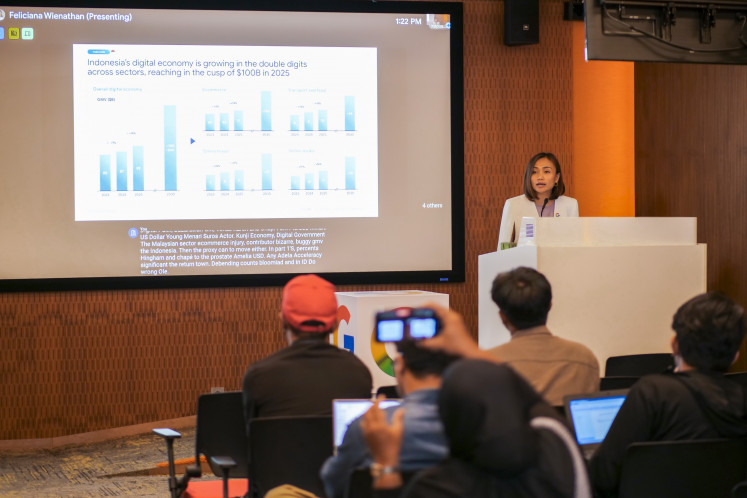Popular Reads
Top Results
Can't find what you're looking for?
View all search resultsPopular Reads
Top Results
Can't find what you're looking for?
View all search resultsDigital economy reaches new highs in 2019
Rapid growth: Workers at the Zalora warehouse sort packages during the 2015 national online shopping day (Harbolnas) in Cibitung, West Java
Change text size
Gift Premium Articles
to Anyone
R
apid growth: Workers at the Zalora warehouse sort packages during the 2015 national online shopping day (Harbolnas) in Cibitung, West Java. E-commerce and ride-hailing services have driven growth in Indonesia’s burgeoning digital economy. (JP/Seto Wardhana)
Indonesia’s burgeoning digital economy continues to reach new heights this year, largely driven by ride-hailing and e-commerce industries, despite several problems including a lack of skilled workers and cyberattacks that could hamper future growth.
Indonesia’s digital economy is expected to be worth US$40 billion this year, up from last year’s $27 billion, representing a 48-percent growth, according to the annual e-Conomy Southeast Asia 2019 report by Google, Temasek and Bain & Company.
The e-commerce and ride-hailing industries are firing on all cylinders this year, with compound annual growth rates (CAGR) projected to be 88 percent and 56 percent, respectively, between 2015 and 2019. Gross merchandise value (GMV) is expected to be $21 billion for e-commerce and $6 billion for ride-hailing.
Meanwhile, online travel and online media, which includes gaming, are also enjoying double-digit growth. Online travel grew at a CAGR of 19 percent with a transactions value of $10 billion, while online media grew 56 percent to $4 billion.
“The e-commerce and ride-hailing sectors are growing rapidly due to large funding and tight competition from local and regional players,” said Google Indonesia managing director Randy Jusuf during a recent press conference about the study.
Indonesia, the second-most-funded country in the region after Singapore, is on track to match the 2018 funding record of $3.8 billion this year as the digital economy sectors booked $1.8 billion in investments in the first half.
Singapore-based Golden Gate Ventures founding partner Vinnie Lauria said he believed the growing global uncertainty did not hurt flows of global investments but could instead boost investment in Indonesia and other countries in Southeast Asia.
“The Indonesian government is progressive on this issue as it has made it easier for foreign investment in digital sectors. There is nothing to fear because it is easier to do business now compared to a few years ago,” Lauria told The Jakarta Post.
“Even as global tech funding takes a hit, Southeast Asia has remained a bright spot. Funding flows into the region continued to grow at a healthy pace, from the high base of the record-breaking 2018,” the e-Conomy report reads. It cites a young population, growing internet connectivity and rising income levels as primary factors behind the growth.
President Joko “Jokowi” Widodo launched the Palapa Ring project in October, a billion-dollar fiber optic development program to connect all corners of the country. The network is expected boost internet connection nationwide in the coming years.
Since 2015, start-ups operating in Southeast Asia raised $37 billion by the first half of 2019, with $24 billion invested in 11 unicorns (start-ups valued at $1 billion), such as on-demand service company Gojek and online marketplaces Bukalapak and Tokopedia.

About $5 billion was invested in more than 70 aspiring unicorns, such as health app Halodoc and online fashion store Zilingo, while $7 billion went into nearly 3,000 start-ups, mostly in the e-commerce, financial technology and health technology sectors.
As funding flows into the region, particularly Indonesia, cyberattacks and internet fraud are threatening Indonesia’s digital economy since the rapid growth of the new economy is not yet supported by adequate protection and reliable technology.
A study released in September by Grant Thornton found that two-thirds of middle-sized and large businesses have experienced at least one cyberattack in the last 12 months, while 73 percent of 500 companies reported a loss of 25 percent as a result of cyberattacks.
A study by the National Cyber and Encryption Agency (BSSN) found that Indonesia was hit by a record 12.9 million cyberattacks last year, representing an average 15 percent growth per year, signifying a rise of cyberattacks in the world’s fourth most populous nation.
The Financial Services Authority (OJK) is undertaking several measures to protect Indonesia’s digital economy this year through its involvement in drafting a data protection bill and continuously urging the financial industry to improve its cybersecurity systems to enhance consumer trust.
“Although financial services in the digital era would never be immune from cyberattacks, companies are obliged to mitigate the risks by updating their cyberdefenses,” the OJK’s deputy commissioner, Sarjito, told the Post recently.
Apart from cyberattacks and internet fraud, challenges to Indonesia’s digital economy growth include a deeply rooted skills gap, with digital talent gaps of about 600,000 per year, according to the Communications and Information Ministry.
A McKinsey & Company report entitled Automation and the Future of Work in Indonesia found that 23 million jobs could be displaced by automation by 2030, but 27 million to 46 million new jobs could be created in the same period if Indonesians learn new skills.
Reskilling, therefore, is key as the IBM’s Institute for Business Value also noted that 120 million workers from the world’s 12 largest economies, including Indonesia, may need to participate in reskilling programs in the next three years as a result of automation enabled by artificial intelligence.
“Retraining and reskilling programs are part of a survival kit; this [600,000 talents] is the size of the gap we need to fill as we need a coordinated effort to tackle the talent deficit,” said Gojek vice president of data science Syafri Bahar in a recent discussion held by the Post.
Gojek, he added, was working together with other companies, such as start-up accelerator Digitaraya, to train people in digital skills. Technology companies from Google, Microsoft, Facebook, Apple, Amazon, Alibaba, Huawei are also providing digital training programs to enhance Indonesians’ skills.










